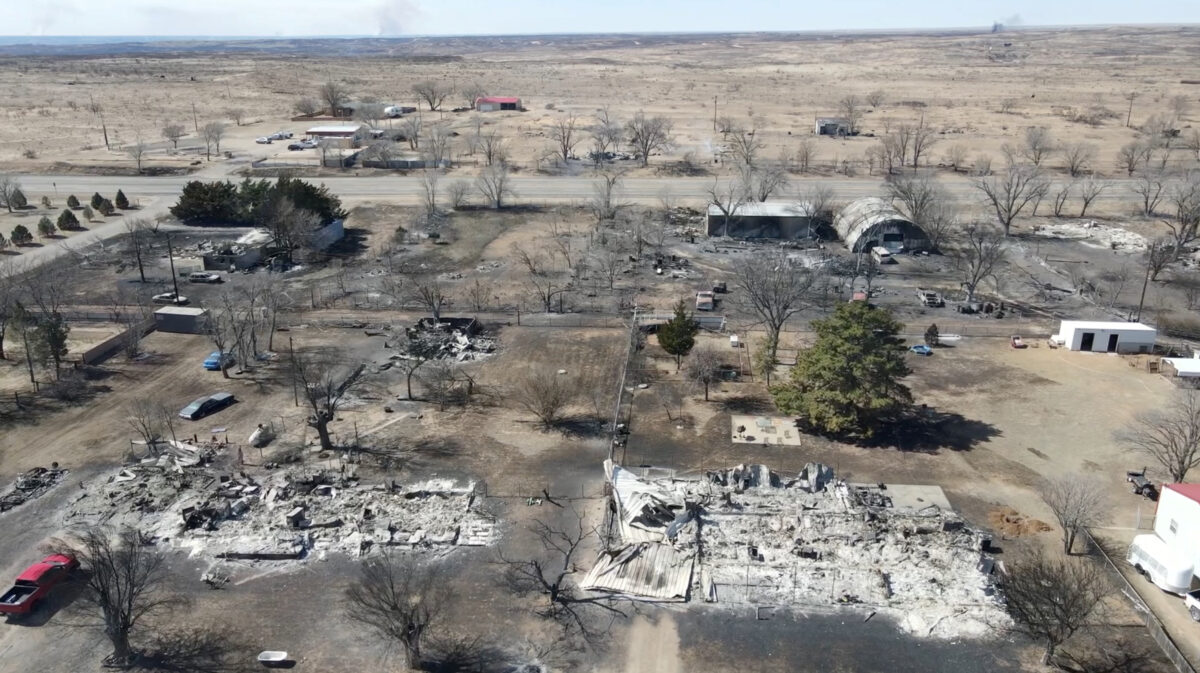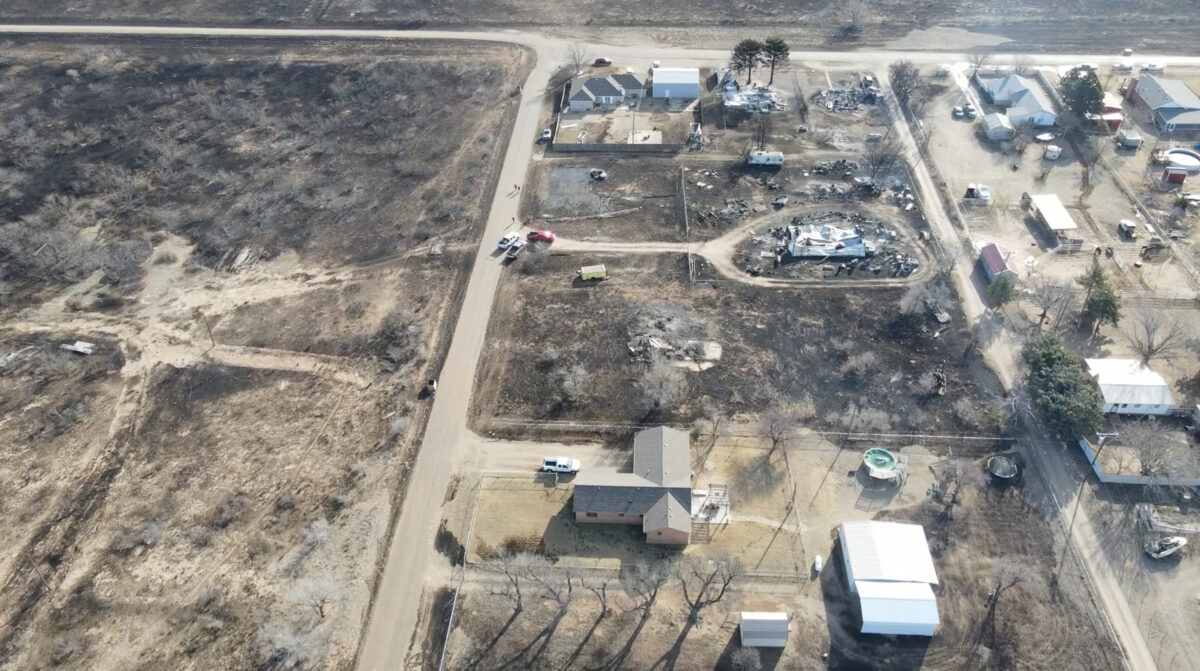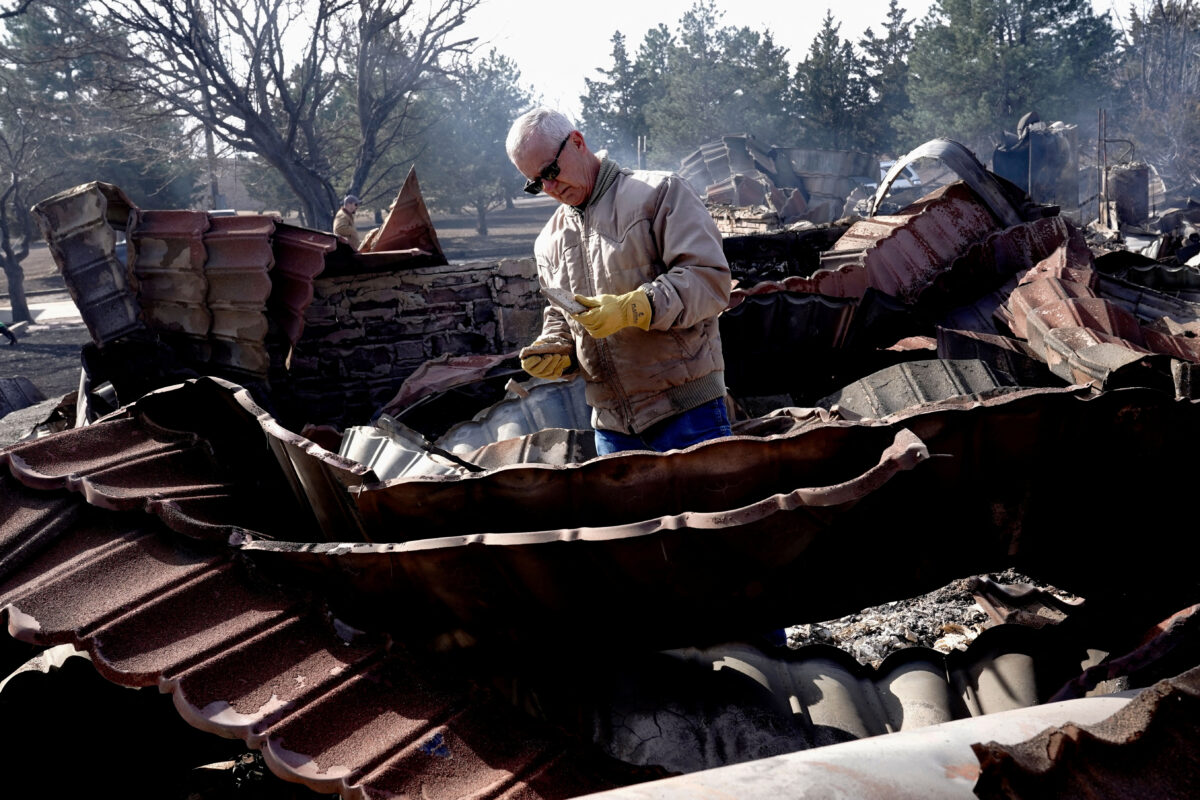Texas wildfires, second-largest on record, rage across Panhandle

A drone view of buildings damaged by a wildfire in Stinnett, Texas, U.S., February 28, 2024, in this screengrab obtained from a social media video. Tucker Stroud/via REUTERS
Richard Murray choked back tears on Wednesday as he surveyed the charred remains of his mechanic’s workshop and home of 50 years in the small Texas Panhandle town of Canadian.
The previous night a sheriff’s deputy had pounded on the door and ordered Murray and his wife Gilissa to evacuate as the state’s second-largest wildfire on record approached their home.
“The house is gone and all the cars are melted,” said Murray, 72, shortly after he returned home Wednesday morning. “There’s nothing left.”
The wildfire, raging northeast of Amarillo since Monday, has blackened 850,000 acres (344,000 hectares) of grasslands and timber since Monday and spread eastward across the border of Oklahoma, the Texas A&M Forest Service reported.
At least one person, an 83-year-old woman in Hutchinson County, was reported by local media to have died in the blaze, dubbed the Smokehouse Creek fire. Firefighters had managed to carve containment lines around just 3% of the blaze as of Wednesday night, officials said.

A drone view of buildings damaged by a wildfire in Stinnett, Texas, U.S., February 28, 2024, in this screengrab obtained from a social media video. Tucker Stroud/via REUTERS
Several smaller wildfires were burning other parts of the state’s northern Panhandle, stoked by fierce winds and hot, dry conditions.
The area scorched by the Smokehouse Creek Fire exceeded the land mass of the state of Rhode Island, making it nearly as immense as the largest wildfire on record in Texas, the East Amarillo Complex Fire that burned 907,000 acres in 2006.
The Forest Service said an as-yet unknown number of structures were damaged and destroyed.
Terrill Bartlett, Canadian’s mayor, said the town was “blessed” that there had been no reports of serious injuries or fatalities, but it was devastating for residents who had lost homes.
“We’re the kind of community that pulls together and supports one another,” he said on Wednesday.
Murray said he and his wife will stay with friends for now and have already received dozens of calls from people offering help. On Wednesday morning, they were searching for their dogs and two cats.
“That’s the hardest thing, not knowing what happened to them,” he said.

Hugh Lively sifts through the remains of his sisters home that was destroyed by the Smokehouse Creek wildfire, in Canadian, Texas, U.S. February 28, 2024. REUTERS/Nick Oxford
The next-largest of the Texas conflagrations was the Windy Deuce Fire, which as of Wednesday night had charred 142,000 acres and was 30% contained.
On Tuesday, the Windy Deuce had crept to within a few miles of the U.S. Energy Department’s Pantex plant, the nation’s primary nuclear weapons assembly facility, located near Amarillo, prompting officials to evacuate non-essential personnel and suspend operations.
But the leading edge of that blaze shifted to the north and west, away from Pantex, on Wednesday, allowing routine activities at the plant to resume.
“Operations at the Pantex Plant returned to normal Wednesday,” the facility said in an online notice. “There is no imminent wildfire threat to the plant at this time.”
On Tuesday, Texas Governor Greg Abbott issued a disaster declaration for 60 counties and directed the Texas Division of Emergency Management to activate more than 95 firefighters as well as personnel to close roads, control traffic, offer medical aid, and provide livestock support.
The Federal Emergency Management Agency (FEMA) and U.S. Forest Service are helping Texas, and federal authorities are in close touch with officials “on the front lines of these fires,” said White House press secretary Karine Jean-Pierre at a news briefing on Wednesday.
More than 13,000 Texas homes and businesses were without power as of Wednesday morning, with more than 4,000 of those in the Panhandle region alone, according to data from PowerOutage.us.
Another resident of Canadian, Julene Castillo, tried to flee on Tuesday evening but was forced back when the smoke became too thick to drive through.
“The fire was burning all around us, we couldn’t get out,” said Castillo, 51, in an interview on Wednesday. “Even with the windows rolled up, your eyes and throat burned.”
Castillo, who works as a secretary for Canadian Methodist Church, drove to the town’s high school where she and about 100 other families “sat and prayed and cried and tried to comfort each other” in the parking lot.
A volunteer firefighter said about 50 homes had burned to the ground in Canadian alone, according to Castillo.
“We didn’t know what else would happen. We could see the fire’s glow as the sun went down,” Castillo said.
Castillo returned home later Tuesday night and discovered her home had survived. She sheltered in place and opened her church on Wednesday for anyone needing a place to stay or pray.

